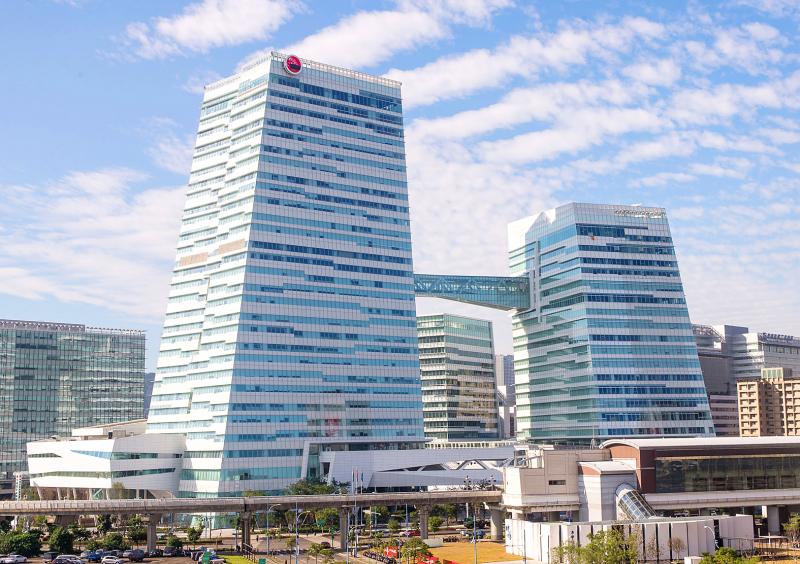CTBC Bank (中國信託銀行) ranked first among its Taiwanese peers for a sixth straight year in the Top 1,000 World Banks list published by The Banker magazine on July 4, jumping two places to the 158th spot in the overall ranking.
The recognition followed last month’s announcement that the bank would be awarded Euromoney magazine’s Awards for Excellence.
CTBC has been named Best Bank in Taiwan 13 times since the award was launched in 1997, outranking all other Taiwanese banks and setting a new record in the nation’s financial sector.

Photo courtesy of CTBC Bank
With its solid business performance and sustained control of asset quality and capital adequacy, CTBC Bank ranked for the sixth time in UK-based The Banker’s top 1,000 list, taking the top position among Taiwan’s banks with US$11.59 billion in tier 1 capital, which is US$658 million more than last year.
Euromoney ranked CTBC Bank as the Best Bank in Taiwan, principally in recognition of its clear strategic blueprint, which focuses on the three main axes of digital transformation, sustainable finance and overseas expansion.
By leading the financial sector in developing a range of business innovations and sustainable reforms, the bank has maintained steady growth even while facing the challenges of financial market turbulence and the COVID-19 pandemic.
CTBC Bank has over the past few years been investing in digital technology and transforming its core systems, partnering with industry leaders in various sectors to develop innovations and synergistically create a range of new business models.
In view of the risks posed by global climate change, CTBC Bank has assumed a key role in working toward net-zero carbon emissions by voluntarily adhering to the UN’s Principles for Responsible Banking and formulating a climate risk management policy.
The bank has set a clear internal business strategy for sustainable development, channeled capital toward green industries and exerted positive financial influence through financing and investment tools to drive corporate transformation and work with customers to promote a low-carbon economy, as well as create a responsible financial ecosystem.

Intel Corp chief executive officer Lip-Bu Tan (陳立武) is expected to meet with Taiwanese suppliers next month in conjunction with the opening of the Computex Taipei trade show, supply chain sources said on Monday. The visit, the first for Tan to Taiwan since assuming his new post last month, would be aimed at enhancing Intel’s ties with suppliers in Taiwan as he attempts to help turn around the struggling US chipmaker, the sources said. Tan is to hold a banquet to celebrate Intel’s 40-year presence in Taiwan before Computex opens on May 20 and invite dozens of Taiwanese suppliers to exchange views

Application-specific integrated circuit designer Faraday Technology Corp (智原) yesterday said that although revenue this quarter would decline 30 percent from last quarter, it retained its full-year forecast of revenue growth of 100 percent. The company attributed the quarterly drop to a slowdown in customers’ production of chips using Faraday’s advanced packaging technology. The company is still confident about its revenue growth this year, given its strong “design-win” — or the projects it won to help customers design their chips, Faraday president Steve Wang (王國雍) told an online earnings conference. “The design-win this year is better than we expected. We believe we will win

Chizuko Kimura has become the first female sushi chef in the world to win a Michelin star, fulfilling a promise she made to her dying husband to continue his legacy. The 54-year-old Japanese chef regained the Michelin star her late husband, Shunei Kimura, won three years ago for their Sushi Shunei restaurant in Paris. For Shunei Kimura, the star was a dream come true. However, the joy was short-lived. He died from cancer just three months later in June 2022. He was 65. The following year, the restaurant in the heart of Montmartre lost its star rating. Chizuko Kimura insisted that the new star is still down

While China’s leaders use their economic and political might to fight US President Donald Trump’s trade war “to the end,” its army of social media soldiers are embarking on a more humorous campaign online. Trump’s tariff blitz has seen Washington and Beijing impose eye-watering duties on imports from the other, fanning a standoff between the economic superpowers that has sparked global recession fears and sent markets into a tailspin. Trump says his policy is a response to years of being “ripped off” by other countries and aims to bring manufacturing to the US, forcing companies to employ US workers. However, China’s online warriors